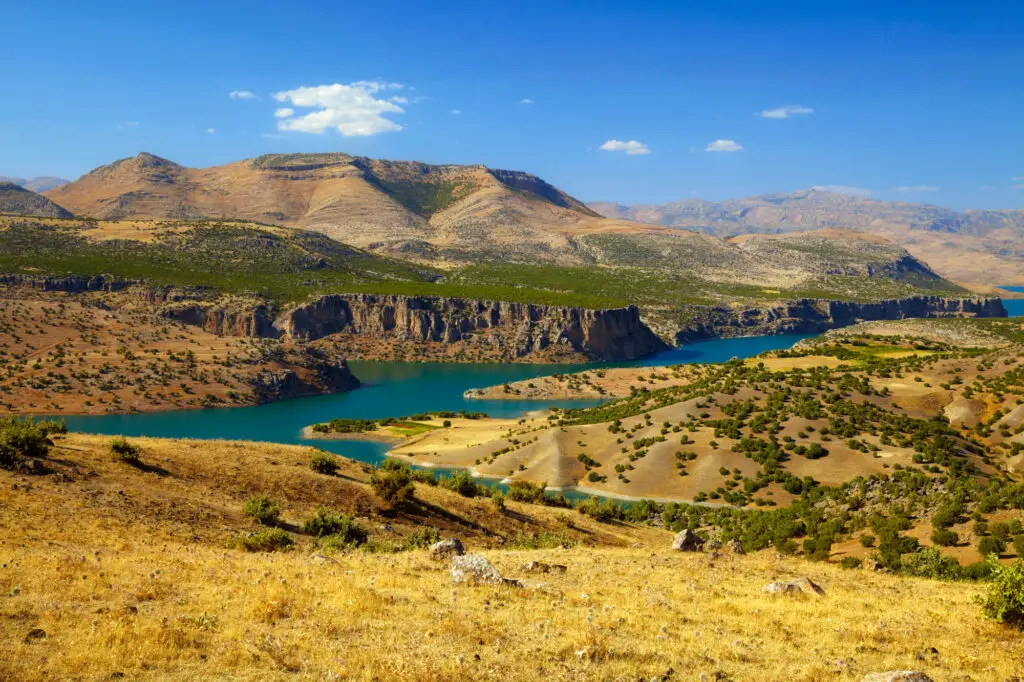Gold has been one of the most sought-after metals throughout human history. It has been valued for its beauty, rarity, and versatility, and civilizations have been known to go to great lengths to acquire it. The Euphrates River, one of the most iconic waterways in the world, has been the subject of many myths and legends, and there have been claims that it contains vast amounts of gold.
The history of the Euphrates River goes back thousands of years, and it has been an important water source for many civilizations, including the ancient Sumerians, Babylonians, and Assyrians. It is also mentioned in both the Bible and the Quran, where it is associated with prophecies and spiritual significance.
Some people believe that the Euphrates River may hold significant deposits of gold. In the past, there have been reports of small-scale gold mining operations along the river, and some treasure hunters have even claimed to have found significant amounts of gold in the riverbed. However, these claims have not been substantiated, and there is no clear evidence that the river contains significant amounts of gold.
Despite this, the idea of gold in the Euphrates River has captured the imagination of many, and it continues to be the subject of speculation and myth. In this blog post, we will explore the history and significance of the Euphrates River, as well as the various claims and prophecies surrounding the possibility of gold deposits in the river.

What Is The Euphrates River Prophecy Regarding Gold In The Bible?
The Euphrates River is mentioned several times in the Bible, and there are prophecies that speak of it in relation to gold. One of the most well-known prophecies is found in the book of Revelation, which is the last book of the New Testament.
In Revelation 9:13-21, it is prophesied that an army of 200 million will be released from the Euphrates River during the end times. This army is said to be led by four angels, and it will bring destruction to a third of the earth’s population.
In Revelation 18:11-19, the Euphrates River is also mentioned in relation to the fall of Babylon. The passage speaks of the great wealth of Babylon, which is described as a city of gold, silver, and precious stones. The passage states that the merchants of the earth will mourn the fall of Babylon because of the loss of its wealth and treasures, which include gold and precious stones.
These prophecies do not specifically state that there is gold in the Euphrates River, but they do suggest that the river is associated with wealth and riches. Some people have interpreted these prophecies as evidence that the Euphrates River may contain significant deposits of gold, and this has led to speculation and myth about the possibility of finding gold in the river.
What Is The Euphrates River Prophecy Regarding Gold In The Quran?
In the Quran, there are also references to the Euphrates River, but there is no specific prophecy that speaks of gold in the river.
In Surah Al-Kahf, which is the 18th chapter of the Quran, there is a story about two men who discover a treasure hidden in a cave. The treasure is described as “a wealth whose keys would have burdened a body of strong men” (18:82), but there is no mention of gold or any specific location of the treasure.
There are also verses in the Quran that speak of wealth and blessings associated with the Euphrates River, but again, there is no specific mention of gold. In Surah Ar-Ra’d, which is the 13th chapter of the Quran, it is said that Allah “made rivers flow in it, and placed in it mountains as sustenance for you” (13:20), indicating that the river has been blessed with resources that can sustain life.
In summary, there is no prophecy in the Quran that specifically speaks of gold in the Euphrates River. Like in the Bible, the river is mentioned in the Quran in relation to wealth and blessings, but these references do not provide any evidence of significant gold deposits in the river.
Has There Been Gold Found In The Euphrates River In The Past?
There have been some reports of small-scale gold mining operations in the Euphrates River in the past, but there is no evidence of significant gold deposits in the river.
According to historical records, there were gold mines in the vicinity of the Euphrates River in ancient times, and some of the gold that was used to make the famous treasures of the Assyrian and Babylonian empires may have come from these mines. However, these mines are not thought to be directly connected to the river itself.
In modern times, there have been reports of small-scale gold mining operations in the Euphrates River, particularly in the eastern region of Syria. These operations involve local villagers who use simple tools to extract gold from the riverbed, and the amount of gold that is extracted is generally small.
It is important to note that these small-scale operations are not evidence of significant gold deposits in the river, as the gold that is extracted is likely to be the result of natural erosion of gold-bearing rocks in the surrounding area rather than a large deposit of gold in the river itself. Additionally, these operations can have negative environmental and social impacts, as they can lead to pollution and conflict between different groups.
In summary, while there have been reports of small-scale gold mining in the Euphrates River in the past, there is no evidence of significant gold deposits in the river, and any such claims should be treated with skepticism.
Will The Euphrates River Drying Up Reveal More Gold?
It is not likely that the Euphrates River drying up would reveal significant new deposits of gold.
When a river dries up, it may expose areas that were previously underwater, which could potentially contain gold deposits that were previously hidden. However, this does not necessarily mean that significant new deposits of gold would be discovered.
Gold deposits are typically found in areas where there has been geological activity, such as the movement of tectonic plates or volcanic activity, and the location of these deposits is determined by a complex set of factors such as the presence of certain minerals, temperature, and pressure.
While the Euphrates River may have carried small amounts of gold deposits downstream in the past, it is unlikely that significant deposits would have accumulated in the riverbed due to the relatively low levels of erosion and sedimentation in the area. Therefore, any gold that may be present in the riverbed is likely to be in small amounts, and the drying up of the river is not likely to reveal large new deposits.
It is also important to note that the drying up of the Euphrates River would have significant environmental and social impacts, as the river is an important source of water and livelihoods for millions of people in the region. Any attempts to extract gold from the riverbed could also have negative environmental and social impacts, and should be approached with caution and sensitivity.

